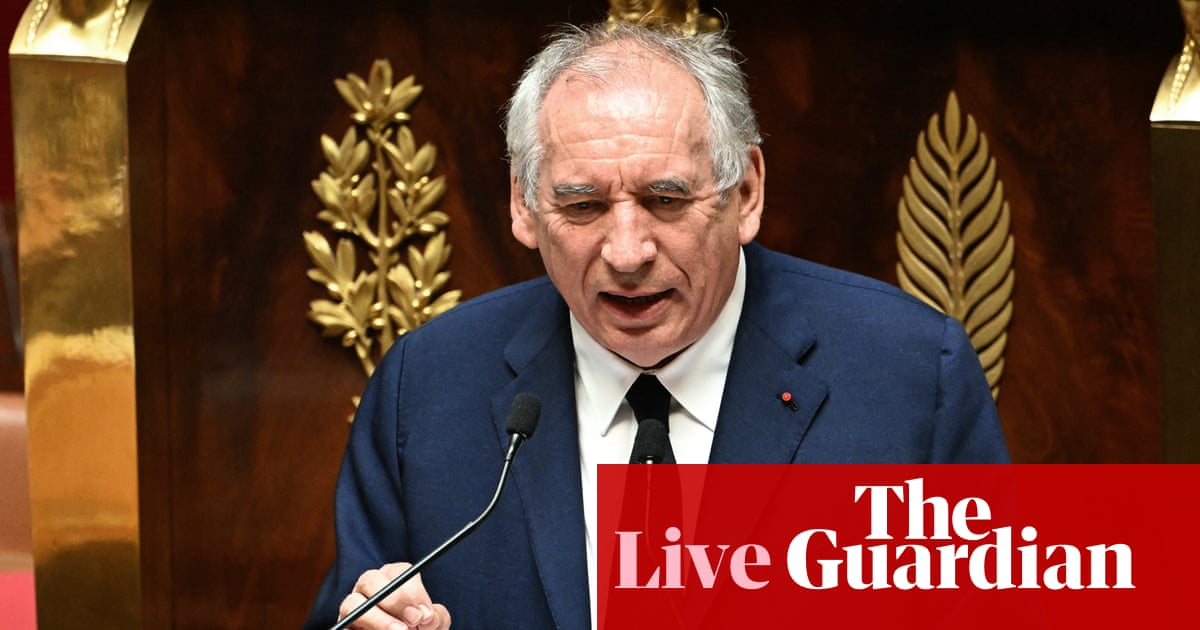Bayrou says lawmakers face ‘not a political, but historical question’ on future of France
Bayrou begins his speech by saying that some of his critics probably considered his decision to call the vote too risky.
But he says he believes the opposite and “the biggest risk would be to not take any risks, to let things carry on as they are, to play politics as usual.”
He says lawmakers will face “not a political question, but a historical question” that will shape the future of France.
Key events
Show key events only
Please turn on JavaScript to use this feature
Bayrou closes debate as vote on confidence in his government about to get under way
We’re nearing the end of the debate, and Bayrou is now back speaking from the podium.
He calls out some of the more radical language in the debate, thanks his ministers, and reiterates some of the main points from his earlier speech saying it’s “a moment of truth” – but this is unlikely to make aby substantial difference at this stage.
We will now go ahead with the vote, which is expected to take 30 minutes, and will close 6.50pm local time (5.50pm UK).
Mathilde Panot, for the hard-left France Unbowed, quickly shatters Attal’s hope for any consensus-based politics as she goes all out against Bayrou and his government.
She says her group is pleased to “never endorsed a single one of your budgets,” accusing successive governments of “leading us into the wall.”
“We do not share your diagnosis, and even less so your remedies,” she says.
She closely links her criticism of Bayrou and Macron, saying towards the end of her speech: “The president doesn’t want to change his policy, so we will have to change the president.”
Updated at 12.07 EDT
Attal hails Bayrou for his “desire of transparency and frankness,” as he says while “none of the MPs in my group will vote to give the government a blank cheque, … [they] will vote for the general interest in stability.”
He calls for a broader, honest debate on the budget in the spirit of consensus.
“Bringing down the government will not resolve either the challenges facing France or the problems of the French people,” he repeats, warning it would only “set our country back a little further.”
Updated at 11.56 EDT
Gabriel Attal, who served as France’s prime minister between January and September 2024, is up next.
He warns that the French are increasingly disenchanted with politics and parliamentary democracy, “at the risk of playing with fire.”
He says “we are living through an exceptional moment in our history,” and insists “France cannot get stuck every month.” “Every month of uncertainty or indecision is a greater threat to the future of the French people,” he says.
But he warns against some people pursuing “a scorched earth policy,” with political posturing and chaos taking precedence over national interest.
“It’s not up to the French to solve the problems of parliament, but up to parliament to solve the problems of the French in front of them,” he quips.
He says that bringing a government would always carries “a political cost, a cost for France,” as he lists practical consequences of not passing a budget – including for the country’s defence, army, and the broader public sector.
Le Pen ends on a strong note, saying that the government should “not wait for the RN to follow you in your fiscal and immigration madness,” as she openly pushes for snap elections.
She says “if the people honour us with a clear mandate … we will go to Matignon to implement, without waiting for the presidential election, a national recovery program for change that can no longer wait.”
ShareLe Pen urges Macron to dissolve parliament, call snap election
Le Pen says that France needs “a reset” to “restart the machine burdened by bugs,” as he insists that Macron should resign in response.
President of Rassemblement National parliamentary group Marine Le Pen delivers a speech following prime minister’s general policy statement at the National Assembly in Paris. Photograph: Bertrand Guay/AFP/Getty Images
“But since this decision depends solely on him … I don’t expect anything on this point,” she concedes.
Instead, she makes a case for dissolving the assembly and calling a snap election, saying this power granted to the president was meant to be “an institutional lever, to break the deadlock.”
She acknowledges rumours that Macron has no intention of doing that, but insists “he must act out of duty … and in the best interest of the country.”
“Everything suggests that legally, politically, and even morally, that dissolution is not an option, but an obligation,” she argues.
She claims that continuing paralysis of the government could turn into a broader crisis, making a passing reference to the 10 September Block Everything movement.
Updated at 11.40 EDT
Le Pen blasts Bayrou’s government, decades of alleged mismanagement of public affairs
The National Rally’s Marine Le Pen is speaking now.
She says the parliament faces “a special political moment,” as she says “those in charge are forced to confront the disastrous results” of decades of mismanagement the consequences of which will affect the generations to come.
She says “what will be remembered above all is the unwavering and unwelcome solidarity of the former political forces” who are responsible for the state of affairs.
Le Pen says the debate marks the “the end of the agony of a phantom government,” which she says “wasn’t governing, but merely administering” the country.
Back to France, Marine Tondelier, the head of the Green party, also doesn’t seem to be too convinced by Bayrou’s speech earlier today.
In a post on X, she said it was a “lacklustre finale,” noting that his speech was “shorter than expected” making it look like “he wasn’t even trying to convince anyone.”
ShareNorway heads to the polls in highly polarised ‘Maga-fication’ election Miranda Bryant
Miranda Bryant
Nordic correspondent
In other big news today, Norway goes to the polls on Monday after an unusually close-fought and polarised election dominated by the cost of living, wealth taxes, oil fund investment in Israel and relations with Donald Trump.
Voters cast their ballots in a voting booth in Slattum near Oslo, Norway. Photograph: Javad Parsa/NTB/AFP/Getty Images
There has been a surge in support for the populist rightwing Progress party led by Sylvi Listhaug, in what has been described by some as “the Maga-fication” of Norwegian politics. In the event of a rightwing victory, Listhaug could become prime minister.
Polling averages for Norway general election in September 2025
But according to polls, the most probable result is a narrow win for the centre-left, meaning a likely continuation of the minority Labour government led by Jonas Gahr Støre, who has been prime minister since 2021, with the former Nato secretary-general Jens Stoltenberg, one of Norway’s most popular politicians, as finance minister.
If, however, Labour does win they could face drawn out negotiations with smaller leftwing parties, particularly over oil fund investment in Israel, which has led to Stoltenberg coming under heavy scrutiny in recent weeks.
After a speech by Cyrielle Chatelain for the Green party’s parliamentary group and a brief break – just 12 minutes – the debate is back under way, with Marc Fesneau speaking now, for the Democrats group.
French prime minister Francois Bayrou gives his speech as his government faces a vote of confidence at the French National Assembly in Paris, France. Photograph: Yoan Valat/EPAShare
Updated at 10.53 EDT
We have got at least 10 leaders to go before the vote, including some big hitters, so I will keep monitoring the debate to bring you the key lines.
You can also keep watching it on our live stream (in French) below:
 French Prime Minister Francois Bayrou faces a vote of confidence – watch liveShare
French Prime Minister Francois Bayrou faces a vote of confidence – watch liveShare
Wauquiez also talks about the instability “eating up” French politics, warning it’s an “economic poison” affecting the state.
He makes a specific reference to the 10 September protests, warning that in his view “the far left is the primary political danger” for France.
He says his party engaged with Bayrou with its proposals, but “have never heard back.”
“You made a choice. I respect it, but I never ask the deputies in my group to vote against their mind,” he says, as he hints they will divide into those backing the government “without any enthusiasm,” and those rejecting it and feeling their voices were not heard.
Laurent Wauquiez is up next, speaking for the Republican Right.
If you were in any doubt, Vallaud confirms that his party won’t back Bayrou, as he uses his speech to outline an alternative version of government – and he ends on an invitation to Macron: “We are ready if he comes to search for us.”
Updated at 10.13 EDT

